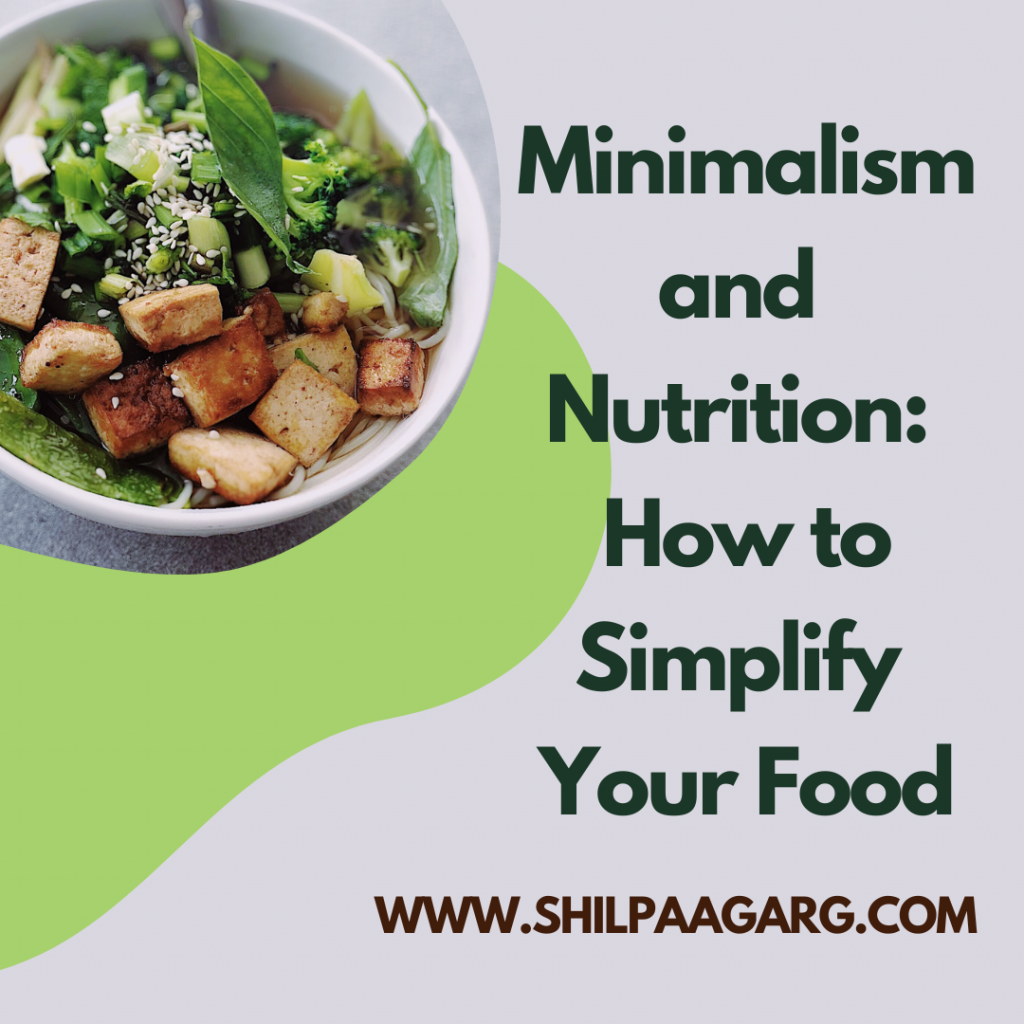Do you think that minimalism and nutrition are at odds with each other? Are you looking to simplify your life and improve your health through minimalism and nutrition? One way to achieve both is through a minimalist approach to nutrition. In this post, we will explore the concept of the minimalist diet, including what it entails and how you can incorporate it into your lifestyle.
What is the Minimalist Diet?
The minimalist diet is a way of eating that focuses on simplifying your food choices and reducing food waste, while still prioritizing nutrition. It involves consuming whole foods and using minimal ingredients to prepare your meals. The goal is to streamline the entire process of meal planning, shopping, prepping, cooking, and cleaning up. By following a minimalist diet, you can simplify your life, save money, and improve your health. Here’s how…
1. Eating ‘Whole’ Foods for Better Nutrition
The foundation of the minimalist diet is eating whole, unprocessed foods for optimal nutrition. This means choosing foods that are as close to their natural state as possible, such as fruits, vegetables, whole grains, and lean proteins. By eating whole foods, you can ensure that you are getting all the nutrients your body needs without any added preservatives, chemicals, or artificial flavors.
2. Using Minimal Ingredients to Keep It Simple
Another aspect of the minimalist diet is using minimal ingredients in your meals. This means focusing on simple recipes that require only a few key ingredients. By using minimal ingredients, you can simplify your shopping list and reduce food waste, while still ensuring that your meals are nutritious and satisfying.
3. Meal Planning
Following meal plans is an effective way to minimize the choices you make when shopping and ensure good nutrition. Planning your meals in advance can help you avoid impulse purchases and ensure that you have all the ingredients you need on hand. Meal planning can also help you save time and money by preparing meals in advance and avoiding last-minute takeout or convenience foods.

4. Simplifying Your Cooking Routine
Streamlining your cooking routine is another important aspect of the minimalist diet for good nutrition. This means simplifying your approach to cooking, using minimal equipment, and focusing on quick and easy recipes. By simplifying your cooking routine, you can save time and reduce the stress of meal preparation, while still ensuring that your meals are healthy and delicious.
5. Zero-Waste Approach to Cooking
Following a zero-waste approach to cooking is another way to embrace the minimalist diet for good nutrition and a healthier planet. This means using up all the ingredients you have on hand and avoiding food waste. One way to do this is by repurposing leftovers into new meals. Additionally, you can compost your food scraps and reduce your environmental impact.
6. Growing Your Own Fruit and Vegetables
Growing your own fruit and vegetables is another way to embrace the minimalist diet for better nutrition and a simpler lifestyle. This allows you to control the quality and freshness of your food, while also reducing your carbon footprint. Additionally, growing your own food can be a rewarding and fulfilling hobby that supports your minimalist and healthy lifestyle.
In conclusion, minimalism and nutrition don’t have to be at odds with each other. The minimalist diet is a way of eating that can simplify your life, improve your health, and reduce food waste, while still prioritizing good nutrition.
Your posts are getting better each day. I am amazed at your research and topics you have selected. Today’s post is fabulous. Meal planning is something I have tried to practice for ages but havent been successful. Trying to follow zero waste in my cooking for sure and growing my veggies is the next step. I have tomatoes, onions, bhindi, nimbu, dhaniya, pudina, and a few other things growing on my OTG for now.
This is such a helpful post, Shilpa.
Minimalism in food and nutrition is beneficial for our health and our environment. It only needs to be implemented on a large scale, by more and more people to reap its benefits.
Minimalism and nutrition are definitely not at odds with each other – in fact they go hand in hand. A nutrition label with many ingredients is going to be less nutritious than a label with just a few ingedients!
I really appreciate the idea that you have put forward Shilpa – minimalism in food consumption. Not only will it keep us healthier but less wastage of food and less stress about getting ingredients or planning the next meal would really be great incentives.
Great post Shilpa. I want to do it since long but somehow with various food choices of all family members, I would not be able to do it in day to day routine. I am totally loving this series. great work, indeed.
I really liked your post. It is very important to follow these points for a healthy and sustainable lifestyle. I have been following this for the past ten years now and it is so therapeutic to simplify food. I don’t use packaged foods or ready to eat ones.
Your tips do help me a lot buddy, I am so going to be mindful of them when I cook now which always seems like a burden, now I know how I can get away with it smartly and nutritiously
I love the idea of the minimalist diet! By focusing on whole foods and using minimal ingredients, we can simplify our meals and reduce food waste. My mother has her own vegetable garden and it’s just a perfect way to lead a happy & healthy lifestyle.
Never thought about it but unconsciously I have been following few of your tips. This is so important and need lot of awareness
We should embrace minimalistic living for ourselves as well as a better life for our kids. This is a futuristic approach to life.